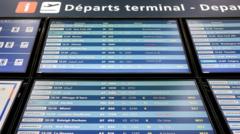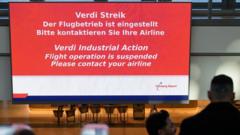Air Canada's recent decision to suspend all operations, following a strike by flight attendants over contract negotiations, has led to considerable disruption in air travel and sparked a government response for binding arbitration.
Air Canada Grounds Flights Amid Flight Attendant Strike

Air Canada Grounds Flights Amid Flight Attendant Strike
Air Canada halts operations due to labor dispute, prompting government intervention.
In a drastic move this Saturday, Air Canada grounded its flights after flight attendants initiated a strike that had been anticipated with a 72-hour notice earlier in the week. The strike arose from stalled contract discussions focusing on wages and unpaid work issues. The union for the flight attendants expressed dissatisfaction with the airline's proposals, claiming they were inadequate in relation to inflation and market standards.
As the strike commenced at midnight, Air Canada quickly began to cancel over 500 flights, impacting approximately 100,000 passengers. While Air Canada Express services were unaffected, the broader suspension of Air Canada and Air Canada Rouge highlighted the seriousness of the ongoing labor disputes. Passengers were warned of a potential "complete cessation of flying" unless negotiations were promptly resolved.
In response to the unfolding situation, Canadian officials intervened, compelling both Air Canada and the Canadian Union of Public Employees (CUPE) to partake in binding arbitration. Federal Jobs Minister Patty Hajdu invoked Section 107 of the Canada Labour Code, aiming to ensure swift resolution to the labor impasse. Despite initial negotiations, CUPE rejected the government's intervention, asserting that it undermined their charter rights and would exacerbate underlying issues.
The strike — the first since 1985 — has heightened tensions, with CUPE representing around 10,000 attendants and voicing concerns regarding their contract demands. Air Canada had proposed a pay increase of 38% over four years; however, the union claimed this offer fell short of accounting for inflation and essential unpaid hours. The Canadian government has historically intervened in various labor disputes affecting Air Canada, often acting as a stabilizing force in severe conflicts.
Air Canada advised passengers to refrain from heading to the airport until further notice, emphasizing the need to remain informed about flight cancellations and alternative travel arrangements. Customers whose flights are affected will be eligible for refunds or alternate options through partnering airlines.
As both parties enter arbitration, the timeline for resolving the strike remains uncertain, echoing past disputes that had left travelers stranded and significantly impacted the airline's finances.
For airline customers, immediate steps include checking for notifications regarding flight changes and options for refunds or cancellations.
Air Canada, Flight Attendants, Strikes, Labor Relations, Canadian Government.
As the strike commenced at midnight, Air Canada quickly began to cancel over 500 flights, impacting approximately 100,000 passengers. While Air Canada Express services were unaffected, the broader suspension of Air Canada and Air Canada Rouge highlighted the seriousness of the ongoing labor disputes. Passengers were warned of a potential "complete cessation of flying" unless negotiations were promptly resolved.
In response to the unfolding situation, Canadian officials intervened, compelling both Air Canada and the Canadian Union of Public Employees (CUPE) to partake in binding arbitration. Federal Jobs Minister Patty Hajdu invoked Section 107 of the Canada Labour Code, aiming to ensure swift resolution to the labor impasse. Despite initial negotiations, CUPE rejected the government's intervention, asserting that it undermined their charter rights and would exacerbate underlying issues.
The strike — the first since 1985 — has heightened tensions, with CUPE representing around 10,000 attendants and voicing concerns regarding their contract demands. Air Canada had proposed a pay increase of 38% over four years; however, the union claimed this offer fell short of accounting for inflation and essential unpaid hours. The Canadian government has historically intervened in various labor disputes affecting Air Canada, often acting as a stabilizing force in severe conflicts.
Air Canada advised passengers to refrain from heading to the airport until further notice, emphasizing the need to remain informed about flight cancellations and alternative travel arrangements. Customers whose flights are affected will be eligible for refunds or alternate options through partnering airlines.
As both parties enter arbitration, the timeline for resolving the strike remains uncertain, echoing past disputes that had left travelers stranded and significantly impacted the airline's finances.
For airline customers, immediate steps include checking for notifications regarding flight changes and options for refunds or cancellations.
Air Canada, Flight Attendants, Strikes, Labor Relations, Canadian Government.






















